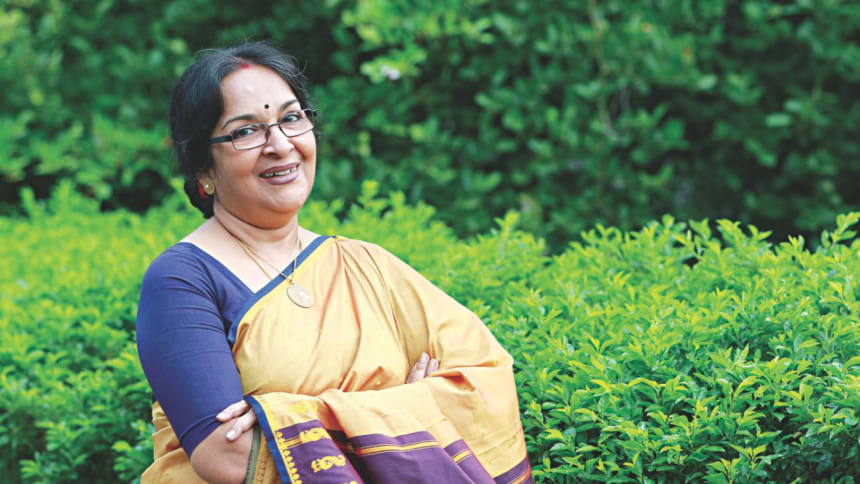In Conversation with MAMATA SHANKAR

Not only is she a celebrated dancer and choreographer, she is also an exceptional actress and has collaborated with stalwarts like Satyajit Ray, Rituparno Ghosh and Mrinal Sen. Through her work, she continues to carry forward their legacy as she passes this torch of artistry on to her own children and students. Mamata Shankar, daughter of legendary performers Uday Shankar and Amala Shankar, recently visited Dhaka to conduct a workshop on choreography, where she took the time to have a conversation with The Daily Star about the Uday Shankar dance form and her upbringing in the Shankar household.
Mamata Shankar said, “The Uday Shankar dance form is the ultimate culmination of many Indian classical and folk dance forms but the style remains identifiable on its own due to its remarkably unique texture. This form has a universal appeal as it allows the performer to express their stories to the audience with ease.” Mamata stated that in order to connect with the audience, a performer must learn to coordinate the essential trio – body, mind and soul. As today's contemporary dance displays extensive athleticism, performances often fall short of conveying a full message to the audience in an attempt to be more visually striking. And this is what creates the basic artistic separation of the Uday Shankar dance form from any other contemporary style.
The Uday Shankar dance form is reputed for utilising many theatrical techniques which provide a distinctive edge to the style. The uniqueness of this form, though, is principally attributed to breaking the fourth wall illusion, which happens to be quite an infrequently used technique in dance performances. As Mamata explained, “My father was an extremely humble human being. He presented all his offerings – all his creations – to the audience in the most humble manner. This, I believe, broke the barrier between the performer and the audience and, to some degree, unified the two.”
While there is often social pressure on children of famous parents to reach the benchmarks set by their parents' accomplishments, Mamata Shankar's experience on this front was quite different: “My parents never made me feel burdened by their achievements, and I would like to thank them from the bottom of my heart for that. I was never forced to learn how to dance or act. Ever since I was a toddler, I developed sponge-like characteristics – I absorbed everything I was exposed to. Since I grew up in a world that revolved around performing arts, dancing and acting came to me naturally. For me, to dance was as simple as it was to breathe.”
Mamata also conveyed a message towards the younger generation of artists in Bangladesh: “Legacy exists to be carried forward by future generations. And I hope that generation's focus can be shifted towards our own culture. We can discover room for progression within our own culture; Western standards are not the ultimate benchmark of development. So my ultimate advice would be to be proud of who you are, carrying on your culture, heritage and legacies.”

 For all latest news, follow The Daily Star's Google News channel.
For all latest news, follow The Daily Star's Google News channel. 



Comments